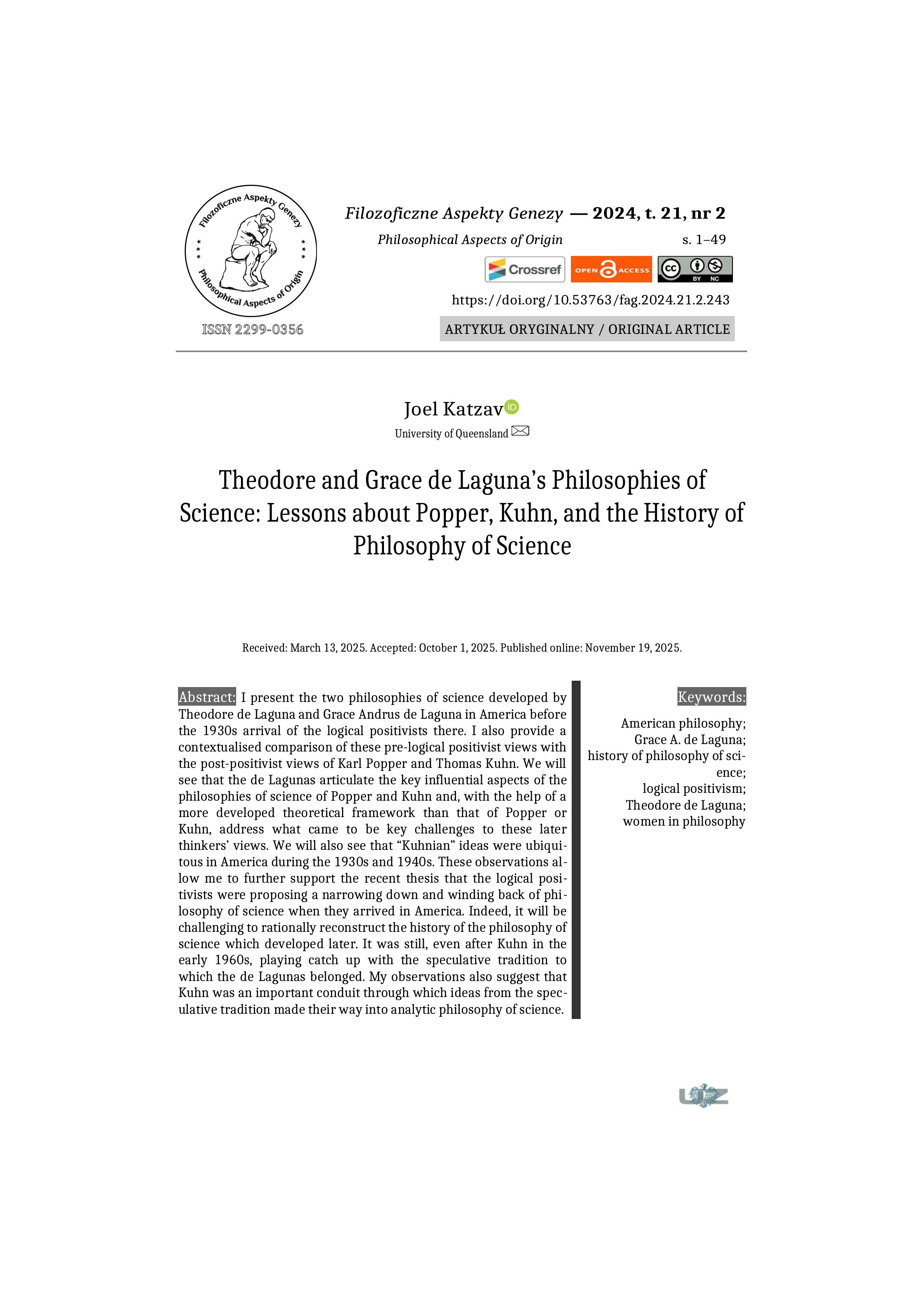Theodore and Grace de Laguna’s Philosophies of Science: Lessons about Popper, Kuhn, and the History of Philosophy of Science

Opublikowane 19.12.2024
Słowa kluczowe
- American philosophy,
- Grace A. de Laguna,
- history of philosophy of science,
- logical positivism,
- Theodore de Laguna
- women in philosophy ...More
Prawa autorskie (c) 2025 Filozoficzne Aspekty Genezy

Utwór dostępny jest na licencji Creative Commons Uznanie autorstwa – Użycie niekomercyjne 4.0 Międzynarodowe.
Jak cytować
Abstrakt
Abstract: I present the two philosophies of science developed by Theodore de Laguna and Grace Andrus de Laguna in America before the 1930s arrival of the logical positivists there. I also provide a contextualised comparison of these pre-logical positivist views with the post-positivist views of Karl Popper and Thomas Kuhn. We will see that the de Lagunas articulate the key influential aspects of the philosophies of science of Popper and Kuhn and, with the help of a more developed theoretical framework than that of Popper or Kuhn, address what came to be key challenges to these later thinkers’ views. We will also see that “Kuhnian” ideas were ubiquitous in America during the 1930s and 1940s. These observations allow me to further support the recent thesis that the logical positivists were proposing a narrowing down and winding back of philosophy of science when they arrived in America. Indeed, it will be challenging to rationally reconstruct the history of the philosophy of science which developed later. It was still, even after Kuhn in the early 1960s, playing catch up with the speculative tradition to which the de Lagunas belonged. My observations also suggest that Kuhn was an important conduit through which ideas from the speculative tradition made their way into analytic philosophy of science.
Downloads
Bibliografia
- Andrus Grace M., Professor Bawden’s Interpretation of the Physical and the Psychical, The Philosophical Review 1904, Vol. 13, No. 4, pp. 429–444, https://doi.org/10.2307/2176910. DOI: https://doi.org/10.2307/2176910
- Bird Alexander, Thomas Kuhn, in: Edward N. Zalta (ed.), The Stanford Encyclopedia of Philosophy, Spring 2022 Edition, https://tiny.pl/41rpqxb9 [16.10.2025].
- Carmichael R.D., The Logic of Discovery, The Open Court Publishing House, Chicago — London 1931.
- Churchman Charles W., Statistics, Pragmatics, Induction, Philosophy of Science 1948, Vol. 15, No. 3, pp. 249–268, https://doi:10.1086/286991. DOI: https://doi.org/10.1086/286991
- Churchman Charles W., Elements of Logic and Formal Science, J.B. Lippincott Company, Chicago 1940.
- Cohen Morris R., Reason and Nature: An Essay on the Meaning of the Scientific Method, Harcourt, Brace and Company, New York 1931.
- Collins James, A Quarter Century of American Philosophy, Schoolman 1950, Vol. 25, No. 1, pp. 46–80, https://doi.org/10.5840/newscholas19512513. DOI: https://doi.org/10.5840/newscholas19512513
- Conant James B., Science and Common Sense, Yale University Press, New Haven 1951.
- Creighton J.E., Methodology and Truth, The Philosophical Review 1901¸ Vol. 10, No. 1, pp. 45–56, https://doi.org/10.2307/2176539. DOI: https://doi.org/10.2307/2176539
- De Laguna Grace A., Cultural Relativism and Science, The Philosophical Review 1942, Vol. 51, No. 2, pp. 141–166, https://doi.org/10.2307/2181158. DOI: https://doi.org/10.2307/2181158
- De Laguna Grace A., The Limits of the Physical, in: George H. Sabine (ed.), Essays in Honour of James Edwin Creighton by Former Students, The MacMillan Company, New York 1917, pp. 175–184.
- De Laguna Grace A., The Practical Character of Reality, The Philosophical Review 1909, Vol. 18, No. 4, pp. 396–415, https://doi.org/10.2307/2177776. DOI: https://doi.org/10.2307/2177776
- De Laguna Theodore and De Laguna Grace A., Dogmatism and Evolution: Studies in Modern Philosophy, The MacMillan Company, New York 1910. DOI: https://doi.org/10.5962/bhl.title.18991
- De Laguna Theodore, On Keynes’ Theory of Probability, The Philosophical Review 1930, Vol. 39, No. 3, pp. 227–242, https://doi.org/10.2307/2179652. DOI: https://doi.org/10.2307/2179652
- De Laguna Theodore, The Externality of Relations, The Philosophical Review 1911, Vol. 20, No. 6, pp. 610–621, https://doi.org/10.2307/2178010. DOI: https://doi.org/10.2307/2178010
- De Laguna Theodore, The Postulates of Deductive Logic, The Journal of Philosophy, Psychology and Scientific Methods 1915, Vol. 12, No. 9, pp. 225–236, https://doi.org/10.2307/2013520. DOI: https://doi.org/10.2307/2013520
- De Laguna Theodore, The Way of Opinion, in: George P. Adams and William P. Montague (eds.), Contemporary American Philosophy: Personal Statements, The MacMillan Company, New York 1930, pp. 401–422.
- De Laguna Theodore, The Factors of Social Evolution, F. S. Crofts and Co., New York 1926.
- Feuer Lewis Samuel, Philosophy and the Theory of Relativity, Science and Society 1947, Vol. 11, No. 3, pp. 259–270, https://www.jstor.org/stable/40399843. DOI: https://doi.org/10.1177/003682374701100305
- Frank Philipp, Between Physics and Philosophy, Harvard University Press, Cambridge (Mass.) 1941, https://doi.org/10.4159/harvard.9780674331976. DOI: https://doi.org/10.4159/harvard.9780674331976
- Hepburn Brian and Andersen Hanne, Scientific Method, in: Edward N. Zalta (ed.), The Stanford Encyclopedia of Philosophy, Summer 2021 Edition, https://tiny.pl/j9snxfc3 [15.10.2025].
- Jacobs Struan, Polanyi’s Presagement of the Incommensurability Concept, Studies in History and Philosophy of Science Part A 2002, Vol. 33, No. 1, pp. 101–116, https://doi.org/10.1016/S0039-3681(01)00031-0. DOI: https://doi.org/10.1016/S0039-3681(01)00031-0
- Jacoby Franklin, Perspectivism in Science, Internet Encyclopedia of Philosophy, https://tiny.pl/r3wn471q [15.10.2025].
- Jarnicki Paweł and Grief Hajo, The »Aristotle Experience« Revisited: Thomas Kuhn Meets Ludwik Fleck on the Road to Structure, Archiv für Geschichte der Philosophie 2022, Vol. 106, No. 2, pp. 1–37, https://doi.org/10.1515/agph-2020-0160. DOI: https://doi.org/10.1515/agph-2020-0160
- Katzav Joel and Vaesen Krist, The Rise of Logical Empiricist Philosophy of Science and the Fate of Speculative Philosophy of Science, HOPOS 2022, Vol. 12, No. 2, pp. 327–358, https://doi.org/10.1086/721135. DOI: https://doi.org/10.1086/721135
- Katzav Joel, Grace de Laguna’s Analytic and Speculative Philosophy, Australasian Philosophical Review 2022, Vol. 6, No. 1, pp. 6–25, https://doi.org/10.1080/24740500.2022.2221835. DOI: https://doi.org/10.1080/24740500.2022.2221835
- Katzav Joel, Speculative Philosophy of Science vs. Logical Positivism: Preliminary Round, in: Sander Verheagh (ed.), American Philosophy and the Intellectual Migration: Pragmatism, Logical Empiricism, Phenomenology, Critical Theory, De Gruyter History of Philosophy and Science, Vol. 1, De Gruyter, Berlin — Boston 2025, pp. 53–76, https://doi.org/10.1515/9783111335209-005. DOI: https://doi.org/10.1515/9783111335209-005
- Katzav Joel, The de Lagunas’ Dogmatism and Evolution, Overcoming Modern Philosophy and Making post-Quinean Analytic Philosophy, in: Eric Schliesser (ed.), Ten Neglected Classics of Philosophy, Vol. 2, Oxford: Oxford University Press, Oxford 2022, pp. 192–214, https://doi.org/10.1093/oso/9780190097196.003.0010. DOI: https://doi.org/10.1093/oso/9780190097196.003.0010
- Katzav Joel, To What Extent Can Institutional Control Explain the Dominance of Analytic Philosophy?, Asian Journal of Philosophy 2023, Vol. 2, No. 45, pp. 1–14, https://doi.org/10.1007/s44204-023-00099-7. DOI: https://doi.org/10.1007/s44204-023-00099-7
- Kraft Victor, Die Grundformen der wissenschaftlichen Methoden, Hölder-Pichler-Tempsky A.-G., Vienna — Leipzig 1925.
- Kuhn Thomas S., The Function of Dogma in Scientific Research, in: Alistair C. Crombie (ed.), Scientific Change: Historical Studies in the Intellectual, Social, and Technical Conditions for Scientific Discovery and Technical Invention, from Antiquity to the Present, Basic Books & Heinemann, New York 1963, pp. 347–369.
- Kuhn Thomas S., The Logic of Discovery or the Psychology of Research?, in: Imre Lakatos and Alan Musgrave (eds.), Criticism and the Growth of Knowledge, Cambridge University Press, Cambridge 1970, pp. 1–24, https://doi.org/10.1017/CBO9781139171434.003. DOI: https://doi.org/10.1017/CBO9781139171434.003
- Kuhn Thomas S., The Structure of Scientific Revolutions, 3rd ed., University of Chicago Press, Chicago 1996.
- Kuhn Thomas S., The Structure of Scientific Revolutions, The University of Chicago Press, Chicago 1962.
- Ladyman James, The History of Philosophy of Science, in: Kelly Becker and Iain D. Thompson (eds.), The Cambridge History of Philosophy, 1945-2015, Cambridge University Press, Cambridge, pp. 189–209. DOI: https://doi.org/10.1017/9781316779651.017
- Lakatos Imre, Falsification and the Methodology of Scientific Research Programmes, in: Imre Lakatos and Alan Musgrave (eds.), Criticism and the Growth of Knowledge, Cambridge University Press, Cambridge 1970, pp. 91–196, http://dx.doi.org/10.1017/CBO9781139171434.009. DOI: https://doi.org/10.1017/CBO9781139171434.009
- Lavine Thelma Zeno, Sociological Analysis of Cognitive Norms, The Journal of Philosophy 1942, Vol. 39, No. 13, pp. 342–356, https://doi.org/10.2307/2017719. DOI: https://doi.org/10.2307/2017719
- Montague William P. and Adams George P., Contemporary American Philosophy: Personal Statements, The MacMillan Company, New York 1930.
- Montoya Leopoldo, de Laguna, Theodore de Leo (1876-1930), Philosopher, American National Biography 2000, https://doi.org/10.1093/anb/9780198606697.article.2001540. DOI: https://doi.org/10.1093/anb/9780198606697.article.2001540
- Nickles Thomas, Scientific Revolutions, in: Edward N. Zalta and Uri Nodelman (eds.), The Stanford Encyclopedia of Philosophy, Spring 2024 Edition, https://tiny.pl/ph5bjcsp [15.10.2025].
- Northrop Filmer Stuart Cuckow, The Logic of the Sciences and the Humanities, Meridian Books, New York 1947.
- Pepper Stephen C., Art and Philosophy at the University of California, 1919 to 1962, An interview by Suzanne B. Riess, Oral History Center, The Bancroft Library, University of California, Berkeley 1963, https://tiny.pl/cbw05mxv [16.10.2025].
- Pepper Stephen C., World Hypotheses: A Study in Evidence, University of California Press, Berkeley 1942.
- Popper Karl R., Logik der forschung; zur erkenntnistheorie der modernen naturwissenschaft, J. Springer, Wien 1935. DOI: https://doi.org/10.1007/978-3-7091-4177-9
- Popper Karl R., The Logic of Scientific Discovery, Routledge, London — New York 2005. DOI: https://doi.org/10.4324/9780203994627
- Quine W.V., The Pursuit of Truth, Harvard University Press, Cambridge (Mass.) — London 1990.
- Rowbottom Darrell P., Popper on Criticism and Dogmatism in Science: A Resolution at the Group Level, Studies in History and Philosophy of Science A 2011, Vol. 42, No. 1, pp. 117–124, https://doi.org/10.1016/j.shpsa.2010.11.031. DOI: https://doi.org/10.1016/j.shpsa.2010.11.031
- Salmon Wesley C., Rational Prediction, The British Journal for the Philosophy of Science 1981, Vol. 32, No. 2, pp. 115–125, https://doi.org/10.1093/bjps/32.2.115. DOI: https://doi.org/10.1093/bjps/32.2.115
- Singer, Jr. Edgar A., Choice and Nature, Mind 1902, Vol. 11, No. 41, pp. 72–91, https://doi.org/10.1093/mind/XI.1.72. DOI: https://doi.org/10.1093/mind/XI.1.72
- Smart Harold R., The Logic of Science, D. Appleton and Company, New York 1931.
- Stokes Geoffrey and Shearmur Jeremy, Popper and His Philosophy: An Overview, in: Jeremy Shearmur and Geoffrey Stokes (eds.), The Cambridge Companion to Popper, Cambridge University Press, Cambridge 2016, pp. 1–29. DOI: https://doi.org/10.1017/CCO9781139046503.001
- The Journal of Philosophy 1942, Vol. 39, No. 19. DOI: https://doi.org/10.5840/schoolman194219251
- The Journal of Philosophy 1945, Vol. 42, No. 4. DOI: https://doi.org/10.2307/2019950
- The Philosophical Review 1943, Vol. 52, No. 6.
- Verhaegh Sander, The Reception of Relativity in American Philosophy, Philosophy of Science 2024, Vol. 91, No. 2, pp. 468–487, https:// doi:10.1017/psa.2023.85. DOI: https://doi.org/10.1017/psa.2023.85
- Werkmeister William H., A Philosophy of Science, Harper and Brothers Publishers, New York — London 1940.
- Werkmeister William H., The Basis and Structure of Knowledge, Harper and Brothers Publishers, New York — London 1948.
- Whitehead Alfred N., Science and the Modern World, Cambridge University Press, Cambridge 1925.
- Wray K.B., The Influence of James B. Conant on Kuhn’s Structure of Scientific Revolutions, HOPOS: The Journal of the International Society for the History of Philosophy of Science 2016, Vol. 6, No. 1, pp. 1–23, https://doi.org/10.1086/685542. DOI: https://doi.org/10.1086/685542
- Wray K.B., Kuhn’s Evolutionary Social Epistemology, Cambridge University Press, Cambridge 2011. DOI: https://doi.org/10.1017/CBO9780511997990


